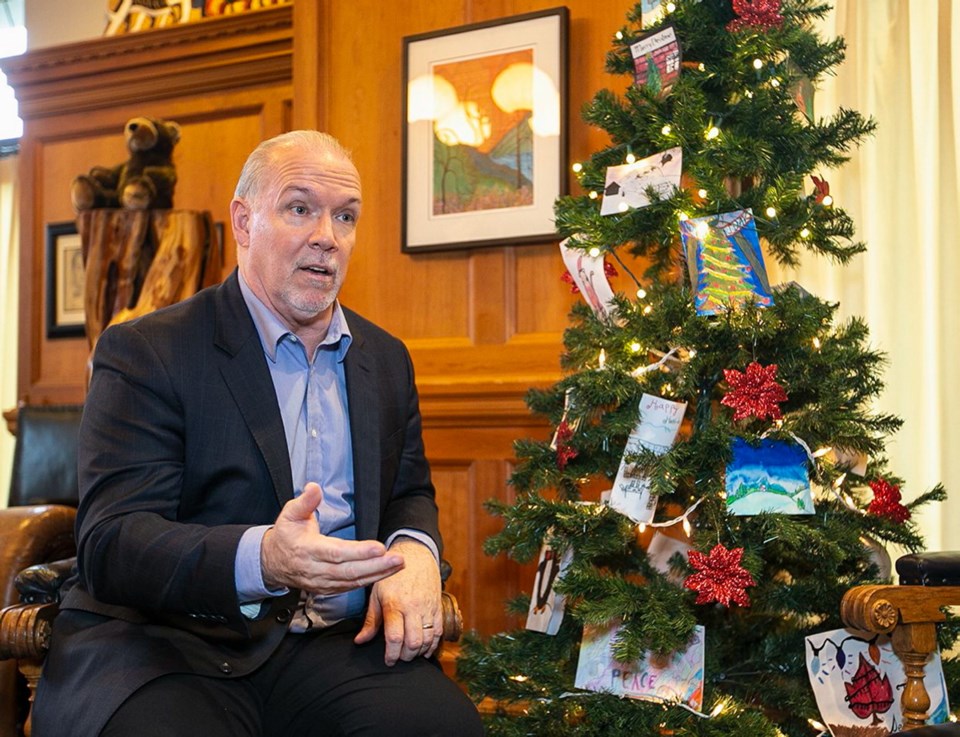The B.C. government could have done a better job anticipating the demand for cannabis to ensure a seamless transition from the grey market to legal pot shops, Premier John Horgan said Thursday.
The reality, instead, is a landscape where cannabis dispensaries have shuttered while they wait for provincial approval and only one government-run B.C. Cannabis store has opened since legalization on Oct. 17.
In a year-end interview with the Times Colonist, Horgan said it’s not yet time to push the “panic button” but he will take stock of B.C.’s cannabis distribution and retail system in the spring.
“I think in British Columbia we could have very much anticipated the demand. There’s a robust underground economy here, distribution of cannabis has been going on for a long time. It’s well established in some communities, illegal as well as in storefronts,” he said.
“I think we had an expectation it would be a seamless transition, but that hasn’t been the case, so I’m as concerned about that as the consuming public and we’re going to do what we can in the new year to start accelerating that.”
Public Safety Minister Mike Farnworth was right when he said “this is not an event, it’s a process,” Horgan said.
“The event was the day and everyone said: ‘A-ha we’re free and clear, cannabis is now legal.’ But it will take more than a day to figure out the distribution network.”
All cannabis retailers must purchase wholesale cannabis from the Liquor Distribution Branch, which will obtain cannabis from federally licensed producers. However, there have already been supply shortages, a problem industry experts predict will continue for years.
On the irony of cannabis being more readily available when it was illegal, Horgan said the difference is that organized crime had an “unimpeded run” on the market.
Horgan acknowledged the illicit market is not going to give up control of the cannabis industry easily.
“One of the objectives of this undertaking is to get the gang lifestyle out of the cannabis market and make it a mainstream controlled substance like tequila or scotch or beer,” Horgan said. “That’s the objective and it’s taking longer than anyone would have wanted.”
In addition to the one B.C. Cannabis store in Kamloops, two privately run cannabis stores in Kimberley have been approved by the Liquor and Cannabis Regulation Branch.
Out of 359 paid applications received by the branch, 185 have been sent to municipal governments or First Nations councils for approval. After the green light at the local level, the application goes to the provincial government for final go-ahead.
Allan Lingwood, chief compliance officer for The Original FARM cannabis retailer, said he’s frustrated by the mixed messages from federal, provincial and municipal governments. Despite having a business licence from the City of Victoria, the company has closed its two locations — one near Hillside shopping centre and the other at Douglas and Johnson streets — while it waits for provincial approval. “With the complete and utter lack of information, there’s been an enormous disruption to business,” he said.
Lingwood said B.C. is far behind Alberta, which has about two dozen government-sanctioned private pot shops. However, many have been crippled by supply shortages.
In a city determined to ensure no grey-market dispensaries opened up before legalization, Langford Mayor Stew Young said the community started vetting prospective cannabis businesses in June with the hope the provincial government would approve some shortly after legalization.
After putting out a request for proposals, the City of Langford short-listed five cannabis operators who passed several criteria including RCMP criminal record checks. Those five retailers were sent to the provincial government in August and Langford is still waiting to hear back.
“The longer it takes after Oct. 17, obviously, the longer that the businesses that want to get involved in a legal thing cannot,” Young said. “That should have been as close to [the legalization] date as we could.” He said the provincial government should have invested in the “manpower to make sure those applications move forward.”
Cannabis retailers will have to pay Langford a $7,500 application fee, which will help pay for a bylaw officer and an RCMP school liaison officer, Young said.
“I don’t expect any money to come from the province or the federal government, because there is no money in this,” Young said, predicting that cannabis will not be the “cash cow” that many anticipate.
Horgan has similar doubts on the profitability of the cannabis industry. During a trip to Washington state, that has legalized cannabis, the B.C. premier received advice from Gov. Jay Inslee, who said “first of all you’re not going to make a billion dollars so don’t kid yourself on this notion,” Horgan recalled.



